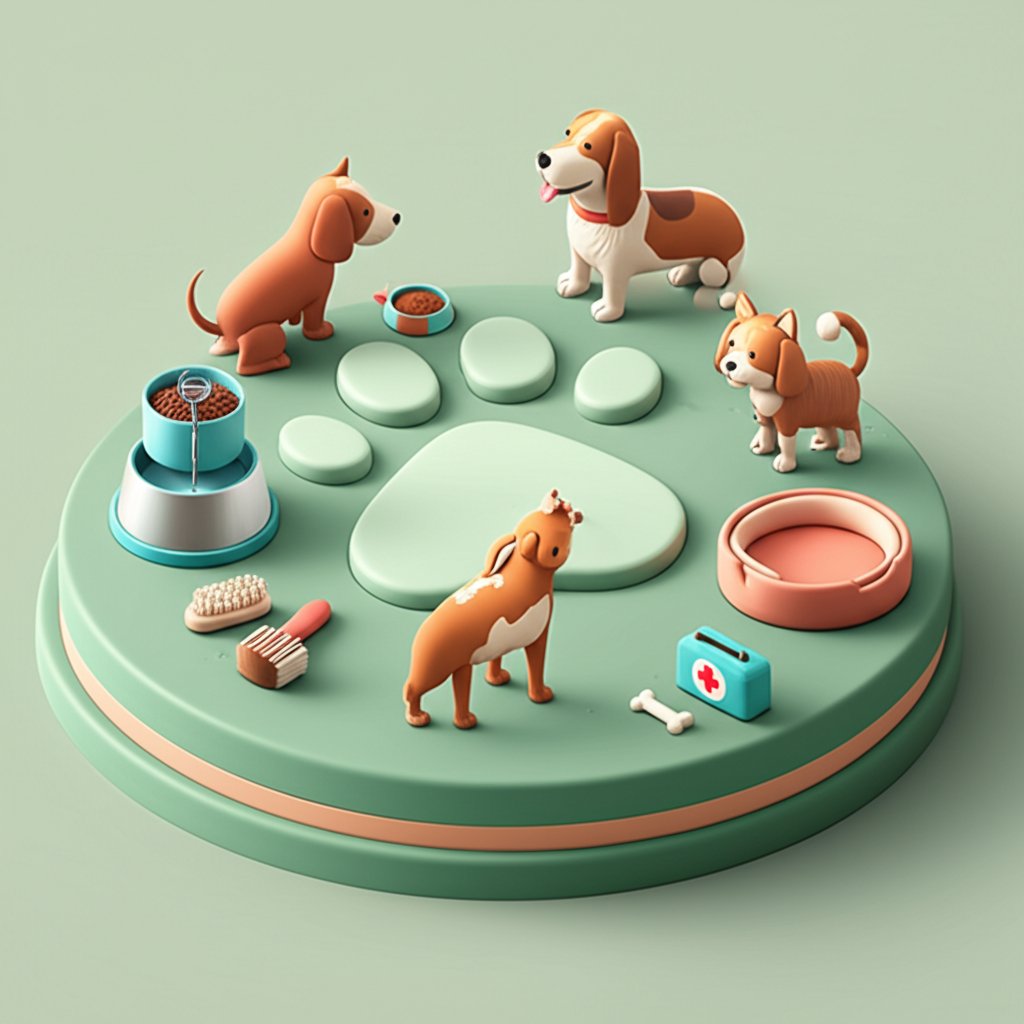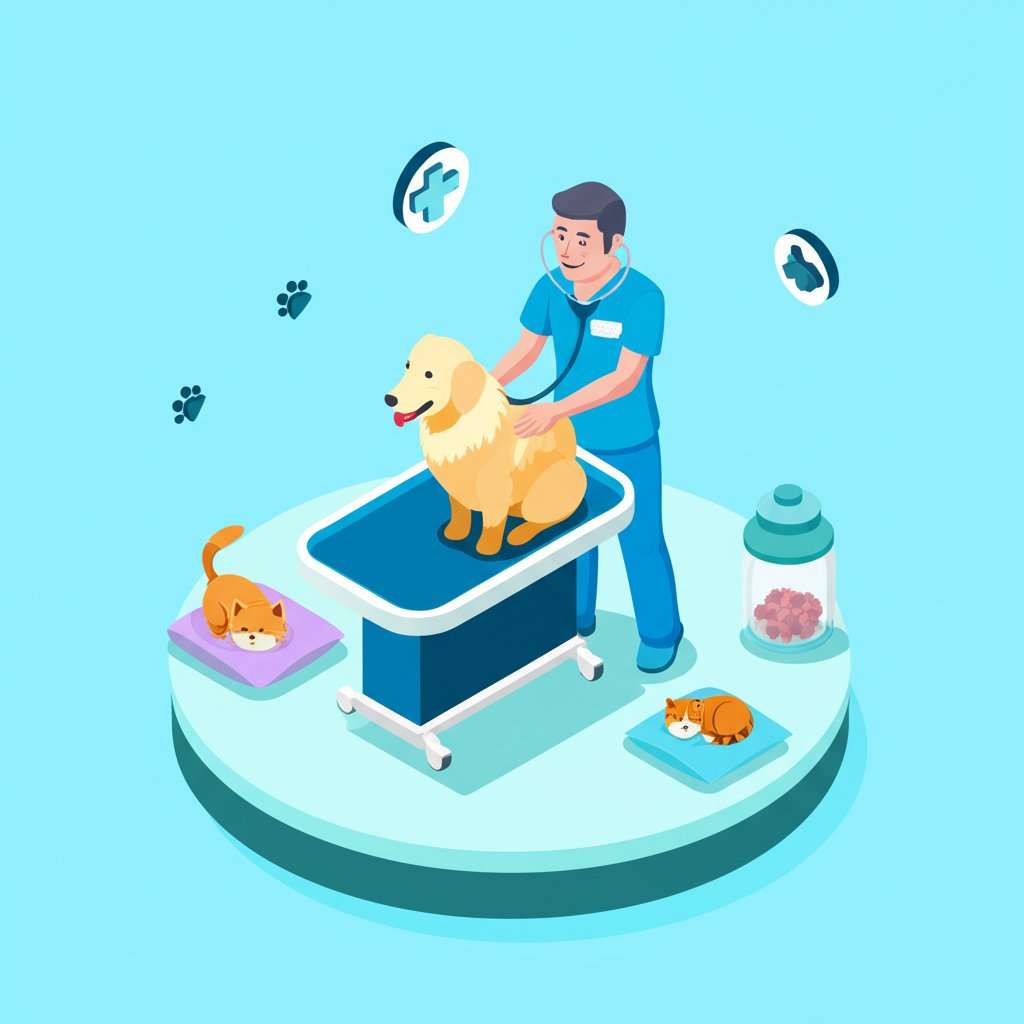Ever wondered what truly goes on behind the scenes at your local animal hospital? Or perhaps you’re curious about the hidden complexities of your pet’s health? The world of veterinary medicine is far more intricate and fascinating than most realize, driven by dedicated professionals who are passionate about animal care. This comprehensive guide will pull back the curtain, revealing astonishing vet facts about everything from the daily lives of veterinarians to groundbreaking advancements in animal health and practical pet care secrets that every owner should know. Prepare to uncover expert insights that will deepen your appreciation for our animal companions and the incredible individuals who safeguard their well-being.
The Unseen World of Veterinary Medicine: Beyond Paws and Purrs

Veterinary medicine is a vast and dynamic field, constantly evolving to meet the diverse needs of the animal kingdom. It’s a profession built on science, compassion, and an unwavering commitment to health, extending far beyond the routine check-ups we commonly associate with our pets.
Understanding the daily challenges vets face highlights the importance of being an informed pet owner, and resources like this guide on veterinary secrets can further enhance your comprehension and partnership with your animal’s healthcare team.
A Day in the Life of a Vet: More Than Just Check-ups
Imagine a typical day for a veterinarian. It’s rarely “typical.” One moment, they might be performing delicate surgery on a beloved family dog, the next, diagnosing a mysterious illness in an exotic bird. Their responsibilities span a wide spectrum: from administering vaccinations and performing routine dental cleanings to complex internal medicine cases, emergency trauma, and even behavioral counseling. Vets are diagnosticians, surgeons, pharmacists, nutritionists, and counselors – often all in the same hour. They are skilled at interpreting subtle cues from patients who cannot speak, relying on a keen understanding of animal health and behavior. This constant variety and the inherent challenges make every day an intellectual puzzle and a test of resilience.
Diverse Specializations: From Exotics to Farm Animals
While many picture vets primarily treating cats and dogs, the scope of veterinary medicine is incredibly broad.
- Small Animal Practitioners: The most common form, focusing on companion animals like dogs, cats, rabbits, guinea pigs, and even hamsters.
- Mixed Animal Practitioners: A unique blend, these vets treat both small pets and large farm animals such as cows, pigs, goats, and horses. Their knowledge base must be incredibly wide to handle species with vastly different physiologies and common ailments.
- Exotic Animal Vets: Specializing in less common pets like reptiles, birds, amphibians, and even small mammals like ferrets or chinchillas. These highly specialized vets understand the unique environmental, nutritional, and medical needs of these often delicate creatures.
- Equine Vets: Dedicated to horses, dealing with everything from lameness and dental care to reproductive services and emergency colic surgery.
- Zoo and Wildlife Vets: These professionals are on the front lines of conservation, providing
animal carefor endangered species, managing disease outbreaks, and rehabilitating injured wild animals. - Public Health Vets: Working to prevent the spread of zoonotic diseases (those that can pass from animals to humans), ensuring food safety, and contributing to global
animal healthinitiatives.
These diverse paths highlight that vet facts about the profession are as varied as the animals themselves.
The Rigorous Path to Becoming a DVM: Years of Dedication
Becoming a Doctor of Veterinary Medicine (DVM) is an arduous journey, demanding intelligence, perseverance, and profound dedication. Aspiring vets typically complete a demanding undergraduate degree, often in biology or animal science, followed by four intensive years of veterinary school. This includes extensive coursework in anatomy, physiology, pharmacology, pathology, surgery, and internal medicine across multiple species. Hands-on clinical rotations are crucial, providing real-world experience under the guidance of seasoned professionals. The DVM degree is notoriously competitive, often requiring higher GPAs and standardized test scores than human medical schools. This rigorous training ensures that every qualified veterinarian possesses a deep understanding of animal health and the critical skills needed to provide exceptional animal care.
Unraveling Animal Health Secrets Through Vet Eyes
Beyond the human-animal bond, there’s a universe of biological wonders and vulnerabilities. Veterinarians, with their unique insights, reveal fascinating vet facts about animal health that often surprise us.
Surprising Animal Anatomy & Physiology Facts
Animals possess incredible adaptations and quirks that influence their animal health.
- Cats are not small dogs: Their physiology and disease processes are distinct. For example, cats cannot metabolize certain drugs that are safe for dogs, making self-medication attempts incredibly dangerous. They also require specific amino acids in their diet that dogs do not.
- Dogs have an extraordinary sense of smell: Their olfactory receptors number around 300 million, compared to humans’ 6 million. This allows them to detect diseases like cancer, low blood sugar, and even upcoming seizures, making them invaluable partners in human and
animal health. - Birds have hollow bones: This lightens their body for flight but makes them susceptible to certain types of fractures. Their respiratory system is also unique, with air sacs that contribute to highly efficient oxygen exchange.
- Reptiles are masters of thermoregulation: Being ectothermic, their body temperature is regulated by external sources. Understanding this is crucial for
pet care, as improper heating can lead to seriousanimal healthissues. - Many animals hide pain: An evolutionary survival instinct, this means
vet factsoften emphasize subtle behavioral changes as critical indicators of suffering, requiring attentive observation from pet owners.
Early Detection & Preventive Care: The Cornerstone of Well-being
One of the most powerful pet care secrets veterinarians want every owner to know is the importance of preventive medicine. Regular check-ups are not just for vaccinations; they are an opportunity for vets to catch potential animal health issues early, often before symptoms become apparent to the untrained eye.
- Vaccinations: Crucial for protecting pets from common, often deadly, infectious diseases.
- Parasite Prevention: Consistent use of flea, tick, and heartworm preventatives is vital, as these parasites can cause serious
animal healthproblems and even transmit diseases to humans. - Dental Health: Dental disease is one of the most common
animal healthissues, affecting up to 80% of pets over age three. Regular dental cleanings and at-home care prevent pain, infection, and systemic disease. - Nutritional Counseling: Vets guide owners on appropriate diets for their pet’s age, breed, and health status, optimizing
animal healthand preventing obesity or nutrient deficiencies.
These proactive measures are fundamental to long-term animal care and significantly improve a pet’s quality of life.
The Power of Diagnostics: What Vets See That We Don’t
When an animal is unwell, veterinarians employ an array of diagnostic tools to uncover the root cause, much like human doctors. These tools are key to veterinary medicine.
- Blood Work & Urinalysis: Provides crucial insights into organ function, infection, inflammation, and metabolic diseases.
- Radiography (X-rays): Essential for visualizing bones, organs, and foreign bodies, helping diagnose fractures, arthritis, and some cancers.
- Ultrasound: Offers real-time imaging of soft tissues and organs, invaluable for checking heart function, abdominal issues, and even pregnancy.
- MRI & CT Scans: Advanced imaging techniques provide detailed views of the brain, spinal cord, and complex soft tissue structures, crucial for neurological and oncological cases.
- Biopsies & Cytology: Microscopic examination of tissue or cell samples confirms diagnoses of cancer, inflammatory conditions, and infections.
These diagnostic capabilities allow vets to move beyond symptoms, providing precise diagnoses and tailored treatment plans for optimal animal health.
Mastering Pet Care: Essential Tips from Veterinary Experts

Effective pet care is a partnership between owners and their veterinary team. Equipped with vet facts and a deep understanding of animal health, vets empower owners to provide the best possible life for their companions.
Nutrition: Fueling Longevity and Vitality
Choosing the right food is one of the most impactful pet care decisions you’ll make.
- Not all pet foods are created equal: Look for diets formulated by veterinary nutritionists, ideally with an AAFCO statement confirming it meets nutritional adequacy.
- Age and lifestyle matter: Puppies and kittens need different nutrients than senior pets. Active dogs require more calories than sedentary ones.
- Manage treats: Treats should make up no more than 10% of a pet’s daily caloric intake to prevent obesity – a major
animal healthconcern. - Beware of human food dangers: Many common human foods are toxic to pets (e.g., chocolate, grapes, xylitol, onions, garlic). Always consult your vet before sharing.
- Hydration is key: Ensure constant access to fresh, clean water. For cats, sometimes a water fountain can encourage more drinking.
Behavioral Insights: Understanding Your Pet’s Silent Language
Observing your pet’s behavior can provide vital vet facts about their inner world and potential animal health issues.
- Changes are red flags: A sudden shift in appetite, energy levels, litter box habits, or personality can indicate underlying pain or illness.
- Body language speaks volumes: Learn to interpret your pet’s signals – a dog’s tucked tail, flattened ears, or excessive licking can signal fear, anxiety, or pain. A cat’s hunched posture or hiding can indicate discomfort.
- Mental stimulation is crucial: Just like physical exercise, mental enrichment prevents boredom and destructive behaviors, contributing to overall
animal care. Puzzle toys, training, and interactive play are essential. - Socialization is vital for puppies/kittens: Early positive exposure to various people, places, and other animals helps them develop into well-adjusted adults.
If you notice persistent behavioral changes, your veterinarian can rule out medical causes or refer you to a veterinary behaviorist.
Common Misconceptions in Pet Care: Busted by Vets
There are many myths surrounding pet care that vet facts can debunk:
- Myth 1: Pets don’t need dental care. Fact: Dental disease is painful and can lead to serious systemic
animal healthproblems. Regular brushing, dental chews, and professional cleanings are essential. - Myth 2: Indoor cats don’t need vaccinations or parasite prevention. Fact: Even indoor pets can be exposed to diseases and parasites carried in on shoes, clothing, or through open windows. Prevention is always better than treatment.
- Myth 3: My pet will tell me if they’re in pain. Fact: Animals are masters at hiding pain. Subtle changes in behavior, appetite, or activity levels are often the only clues.
- Myth 4: Grain-free diets are always better. Fact: Unless your pet has a diagnosed grain allergy (which is rare), grain-free diets offer no inherent
animal healthbenefits and, in some cases, have been linked to heart conditions in dogs. Always consult your vet.
The Future of Animal Care: Innovations in Veterinary Medicine
The field of veterinary medicine is constantly pushing boundaries, bringing cutting-edge technologies and philosophies to improve animal health and animal care.
Breakthroughs in Treatments: From Stem Cells to AI
The future of veterinary medicine promises even more advanced treatment options:
- Stem Cell Therapy: Used in regenerative
veterinary medicineto treat conditions like osteoarthritis, tendon injuries, and kidney disease, promoting natural healing and reducing pain. - Advanced Cancer Therapies: Similar to human oncology, pets now benefit from tailored chemotherapy, radiation therapy, and even immunotherapy, extending their lives and improving their quality of life.
- Minimally Invasive Surgery: Techniques like laparoscopy and endoscopy reduce recovery times and post-operative pain for many procedures.
- Personalized Medicine: Genetic testing helps vets identify predispositions to certain diseases and tailor preventative
animal careplans, as well as predict responses to specific medications. - Artificial Intelligence (AI): AI is beginning to assist
veterinary medicineby analyzing diagnostic images (like X-rays and MRIs) for subtle abnormalities, helping vets make faster, more accurate diagnoses.
These innovations are transforming animal care, offering hope and improved outcomes for pets facing complex animal health challenges.
Telemedicine and Accessibility: Bridging Gaps in Care
The digital age is making veterinary medicine more accessible. Telemedicine, including virtual consultations, allows pet owners to connect with vets remotely, especially for follow-up appointments, prescription refills, or minor concerns. This is particularly beneficial for pet owners in rural areas or those with mobility challenges, ensuring consistent animal care. While it doesn’t replace hands-on examinations, it enhances the continuum of care and provides greater convenience.
One Health Approach: Protecting Animals, Humans, and the Planet
A critical vet fact that’s gaining global recognition is the “One Health” concept. This approach recognizes that the health of humans, animals, and the environment are inextricably linked. Veterinarians are at the forefront of this movement, working to:
- Monitor and control zoonotic diseases: From rabies to Lyme disease, vets play a vital role in preventing the spread of diseases between animals and humans.
- Ensure food safety: Large animal veterinarians protect public
healthby monitoring livestock and poultry for diseases and ensuring food products are safe for consumption. - Protect wildlife and ecosystems: Through conservation efforts and understanding environmental factors affecting
animal health, vets contribute to the health of the entire planet.
This holistic perspective underscores the profound and far-reaching impact of veterinary medicine on global well-being.
Conclusion
The world of veterinary medicine is a testament to the incredible dedication of professionals committed to animal health and animal care. From the intricate vet facts of animal physiology to the groundbreaking advancements shaping the future, every aspect reveals a profession driven by science, compassion, and tireless effort. Understanding these secrets not only educates us but also empowers us, as pet owners, to provide the best possible pet care for our beloved companions.
Next time you visit your veterinarian, remember the depth of their knowledge, the rigor of their training, and the immense passion they bring to their work. They are truly revealing the secrets to a healthier, happier life for our amazing animal friends. Embrace these insights, apply the pet care tips, and become an even better advocate for your pet’s well-being.
FAQ
Q: What is the most surprising fact about veterinary medicine?
A: One of the most surprising vet facts is the sheer breadth of knowledge required. Unlike human doctors who specialize early, veterinarians are expected to be experts in a vast array of species (mammals, birds, reptiles, sometimes even fish), understanding their unique anatomies, physiologies, diseases, and behavioral patterns, all while acting as diagnosticians, surgeons, dentists, and more.
Q: How can pet owners contribute to better animal care at home?
A: Pet owners can significantly improve animal care by prioritizing preventive measures: regular veterinary check-ups, consistent vaccinations and parasite prevention, providing a high-quality, species-appropriate diet, ensuring adequate exercise and mental stimulation, and being observant of any subtle changes in their pet’s behavior or physical condition.
Q: What are some emerging trends in veterinary medicine to improve animal health?
A: Emerging trends in veterinary medicine that are enhancing animal health include the use of regenerative therapies like stem cells, advanced diagnostics such as AI-assisted imaging, personalized medicine based on genetic profiles, and the expansion of telemedicine to improve accessibility to animal care. The “One Health” approach, linking animal, human, and environmental health, is also growing in importance.
Q: Do vets only treat sick animals, or do they play other roles?
A: Vets do far more than just treat sick animals. They are crucial in preventive animal care (vaccinations, wellness exams), public health (disease surveillance, food safety), research, education, and conservation. Many vet facts highlight their roles as advocates for animal health and welfare across various sectors, not just clinical practice.
Q: What’s a common pet care mistake that vets wish owners would avoid?
A: A very common pet care mistake vets wish owners would avoid is neglecting dental hygiene. Dental disease is rampant in pets, causing significant pain and leading to other serious animal health problems if left untreated. Regular dental check-ups, professional cleanings, and at-home dental care are vital for a pet’s overall well-being.










